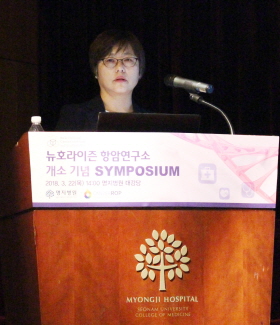A local stem cell developer has raised a possibility that dendritic cells might be used as an anticancer treatment.

Lee Hyun-ah, head of research and senior managing director at Pharmicell, had a presentation on the latest cancer therapy using dendritic cells at the Myongji Hospital’s symposium on Thursday to celebrate the opening of New Horizon Cancer Institute.
Dendritic cells act as commanders of the immune system to order immune cells such as T cells to be explicitly activated for the antigen.
In 2011, Ralph Steinman discovered dendritic cells and won the Nobel Prize in Physiology or Medicine. Since then, researchers began to study dendritic cells as anticancer treatments in earnest.
In Korea, research on dendritic cells started in 2005 when then-Food and Drug Administration (currently the Ministry of Food and Drug Safety) approved clinical trials for related drugs. JW CreaGene, which obtained the first approval, is leading the sector in commercialization.
Later on, Pharmicell, Binex, Severance Hospital, and Asan Medical Center joined the development move. The competition has heated up lately with Vaxcell Bio jumping in the market.
JW CreaGene is conducting phase-3 trials on CreaVax-HCC to treat liver cancer. Dendreon, Northwest Biotherapeutics, and Sotio are either selling a therapy or having a phase-3 study to treat prostate cancer.
To treat pancreatic cancer, Tella is in phase-3 trials using WT1 and MUC1. The agents are also targeting kidney cancer, glioblastoma, and melanoma.
Pharmicell’s treatment uses dendritic cells that were multiplied and differentiated in “hematopoietic stem cells of bone marrow.”
By developing the technique, Pharmicell holds technology patents that differentiate hematopoietic stem cells into dendritic cells.
Dendritic cells used in local clinical trials for anticancer immunotherapies are all cultured in monocytes. Thus, they are safe and could be used as anticancer vaccines by making them induce anticancer immune responses. However, no clinical trials have confirmed their efficacy in removing a tumor.
Pharmicell has been conducting researchers’ clinical trials on various cancers including breast cancer, kidney cancer, ovarian cancer, prostate cancer, glioblastoma, and malignant melanoma.
The differentiation from hematopoietic stem cells of bone marrow is expected to overcome the limitation of dendritic cells cultured in monocytes and show higher therapeutic effect.
Pharmicell’s trials are going smoothly. The Ministry of Health and Welfare picked the company's studies on incurable prostate cancer and ovarian cancer as part of the “advanced medical technology development project for the second half of 2016.” The studies are at the stage of the non-clinical efficacy testing.
The company has completed the test for efficacy for prostate cancer in late February. The test on ovarian cancer is underway. Upon the completion of the test, the company will move on to the toxicity testing. After that, the stem cell developer will enter the clinical stage.
“Based on the encouraging results of the non-clinical efficacy test, we hope to complete the non-clinical toxicity test in the GLP (Good Laboratory Practice) system, and plan to apply for phase-1 clinical trials for IND (Investigational New Drug) within this year,” said Pharmicell’s Lee. “I will work hard on the research so that we can obtain good results.”

